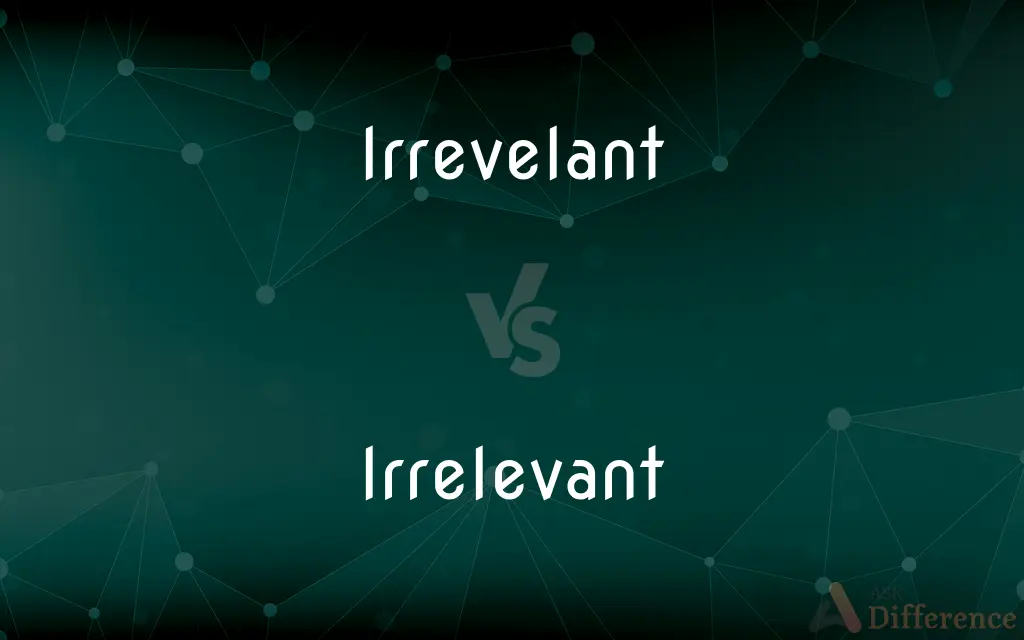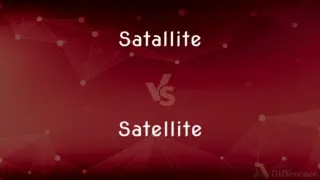Irrevelant vs. Irrelevant — Which is Correct Spelling?
By Tayyaba Rehman — Updated on March 26, 2024
"Irrevelant" is a common misspelling. The correct spelling is "Irrelevant," meaning not related or pertinent to the matter at hand.

Table of Contents
Which is correct: Irrevelant or Irrelevant
How to spell Irrelevant?

Irrevelant
Incorrect Spelling

Irrelevant
Correct Spelling
ADVERTISEMENT
Key Differences
Recall that "ant" is not relevant to "Irrelevant."
Remember "Irrelevant" contains the root "relev" (as in relevant).
Associate "Irrelevant" with the correct "relevant" but with "Ir-" prefix meaning "not."
"Irrevelant" has an extra 'a'; avoid it.
Think of the phrase "not relevant" to remember "Ir-relevant".
ADVERTISEMENT
How Do You Spell Irrelevant Correctly?
Incorrect: Irrevelant information often confuses the topic even more.
Correct: Irrelevant information often confuses the topic even more.
Incorrect: He made an irrevelant comment during the meeting.
Correct: He made an irrelevant comment during the meeting.
Incorrect: She mentioned some irrevelant details in her story.
Correct: She mentioned some irrelevant details in her story.
Incorrect: Their argument seems quite irrevelant to the case.
Correct: Their argument seems quite irrelevant to the case.
Incorrect: I think that fact is completely irrevelant.
Correct: I think that fact is completely irrelevant.
Irrelevant Definitions
Irrelevant denotes lack of importance in the given context.
Age is irrelevant when it comes to talent.
Irrelevant can refer to something not applicable or not germane.
His opinion on this matter is irrelevant.
Irrelevant can suggest lack of meaningful relationship between subjects.
The evidence was deemed irrelevant to the case.
Irrelevant means not connected with or pertinent to the matter.
The comment was completely irrelevant to the discussion.
Irrelevant indicates something that doesn't bear upon or aid in determining the matter.
These details are irrelevant to the main issue.
Unrelated to the matter being considered.
Not relevant, as:
Not at all related: totally unrelated, wholly unconnected, completely inapplicable.
Not usefully related: not associated in any way that is important or useful to the context being discussed: not materially applicable; having connections not applicable in the present situation.
Having no bearing on or connection with the subject at issue;
An irrelevant comment
Irrelevant allegations
Irrelevant Meaning in a Sentence
When researching, it's crucial to distinguish relevant from irrelevant data.
Ignoring irrelevant details helps you focus on what's important.
He was upset because he felt his questions were dismissed as irrelevant.
The reviewer criticized the movie for its many irrelevant scenes.
She skipped over the irrelevant chapters to save time.
Teachers often remind students not to include irrelevant information in their essays.
In a debate, bringing up irrelevant points can weaken your argument.
Feedback should be constructive and not focus on irrelevant aspects.
During the meeting, we decided to omit all irrelevant discussion to save time.
Understanding what is irrelevant is key to simplifying complex issues.
During revision, he removed all irrelevant content to improve clarity.
Social media is full of irrelevant information that can distract you from your goals.
In science, focusing on irrelevant variables can lead to incorrect conclusions.
The article included a lot of irrelevant statistics that didn't support the main point.
Her presentation was concise because she didn't include any irrelevant information.
The law requires that jurors disregard all irrelevant evidence when making a decision.
In math, ignoring irrelevant information can help solve problems more efficiently.
To solve the problem, we must ignore all the irrelevant factors.
It's important to stay on topic and avoid veering into irrelevant territory.
Detectives sift through irrelevant clues to find the ones that matter.
Common Curiosities
Which vowel is used before Irrelevant?
"An" as in "an irrelevant."
Why is it called Irrelevant?
Derived from the prefix "ir-" (meaning not) and "relevant," indicating something not pertinent.
What is the verb form of Irrelevant?
Irrelevant is an adjective. It doesn't have a verb form.
Which preposition is used with Irrelevant?
Various prepositions can be used, e.g., "irrelevant to", "irrelevant for".
What is the singular form of Irrelevant?
Irrelevant.
What is the plural form of Irrelevant?
Irrelevancies (but note: the meaning changes).
Is Irrelevant an adverb?
No.
Is Irrelevant an abstract noun?
No.
What is the pronunciation of Irrelevant?
ɪrˈreləvənt
What is the root word of Irrelevant?
The root word is "relevant."
Which conjunction is used with Irrelevant?
No specific conjunction is tied to the word.
Is Irrelevant a noun or adjective?
Adjective.
Is Irrelevant a negative or positive word?
Negative (since it indicates lack of pertinence).
Is Irrelevant a vowel or consonant?
"Irrelevant" is a word, not a vowel or consonant.
Which article is used with Irrelevant?
Both "a" and "an" can be used, depending on pronunciation and preference.
Is the word Irrelevant imperative?
No.
Is the word Irrelevant a gerund?
No.
Is the word “Irrelevant” a Direct object or an Indirect object?
Neither; it's an adjective.
Is Irrelevant a collective noun?
No.
What part of speech is Irrelevant?
Adjective.
What is the first form of Irrelevant?
Not applicable; it's an adjective.
What is the second form of Irrelevant?
Not applicable.
What is the third form of Irrelevant?
Not applicable.
Is Irrelevant a countable noun?
No.
Is the Irrelevant term a metaphor?
No.
Which determiner is used with Irrelevant?
Any appropriate determiner can be used, e.g., "this", "that", "an".
How is Irrelevant used in a sentence?
"Her remarks were completely irrelevant to the topic we were discussing."
How many syllables are in Irrelevant?
Four.
How do we divide Irrelevant into syllables?
Ir-rel-e-vant.
What is a stressed syllable in Irrelevant?
The second syllable, "rel."
What is another term for Irrelevant?
Inapplicable.
What is the opposite of Irrelevant?
Relevant.
Share Your Discovery

Previous Comparison
Satallite vs. Satellite
Next Comparison
Piwot vs. PivotAuthor Spotlight
Written by
Tayyaba RehmanTayyaba Rehman is a distinguished writer, currently serving as a primary contributor to askdifference.com. As a researcher in semantics and etymology, Tayyaba's passion for the complexity of languages and their distinctions has found a perfect home on the platform. Tayyaba delves into the intricacies of language, distinguishing between commonly confused words and phrases, thereby providing clarity for readers worldwide.



































